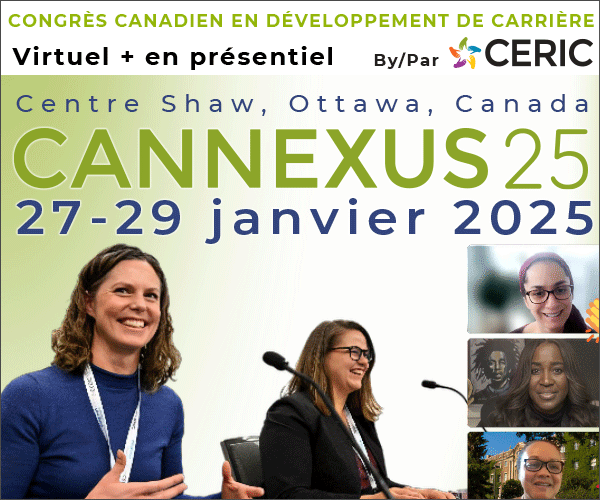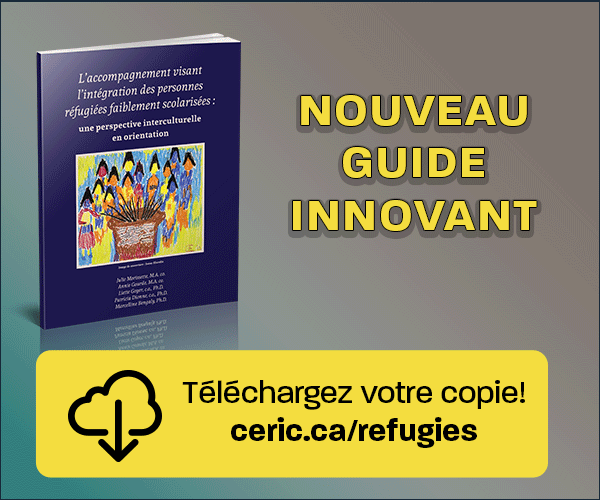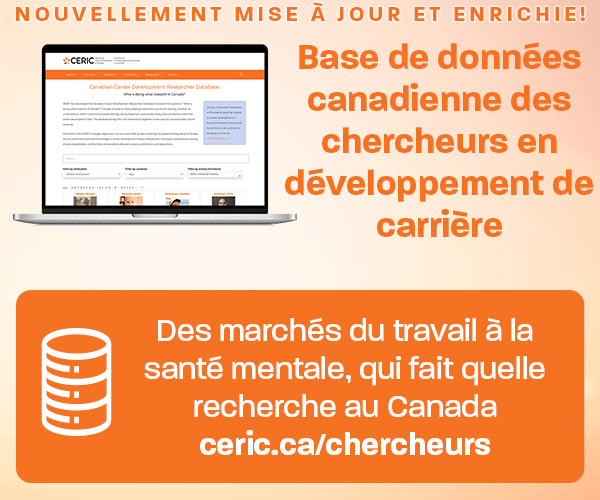L'impact de la formation à l'information sur le marché du travail sur les perceptions de l'auto-efficacité liée à l'emploi des stagiaires : Une comparaison de l'influence de deux méthodes de prestation sur l'expression de la compétence et de la confiance.
Mots-clés :
auto-efficacité, informations sur le marché du travail, formation, stagiaires, emploi, compétence, confianceRésumé
Les résultats des entrevues menées auprès de travailleurs de l’automobile déplacées qui ont participé à une expérience de terrain de tester l’impact des interventions du travail d’information du marché liées à l’emploi auto-efficacité sont rapportés. L’auto-efficacité, exprimée à travers la compétence et la confiance des impacts comportement du marché du travail. Choix de carrière aide peut être mieux adapté à des séances de counseling en tête-à-un afind’adapter la formation aux intérêts individuels. Recherched’emploi IMT interventions sont perçues comme plus efficace lorsqu’elle est fournie à des séances de groupe. Le soutien social améliore l’auto-efficacité liée à l’emploi par renforcer les compétences et la confiance.
Références
Bandura, A. (1977). Self-efficacy: Toward a unifying theory of behavioral change. (Abstract). Psychological Review, 82(4) 191-215.
Bandura, A. (1982). Self-efficacy mechanism in human agency. American Psychologist, 27(2).
Bandura, A. (1994). Self-efficacy. In V. S. Ramachaudran (Ed.). Encyclopedia of Human Behavior, 4, pp. 71-81. New York: Academic
Press. (Reprinted in H. Friedman [Ed.], Encyclopedia of mental health. San Diego: Academic Press, 1998).
Currie, Sheila; Downie, Michael; Nicholson, Claudia; Oreopoulos, Philip & Voyer, JeanPierre (2009). Navigating the Labour Market: Final Report. Social Research and Demonstration Corporation.
Deaves, Richard; Luders, Erik; Guo Ying Luo (2009). An Experimental Test of the Impact of Overconfidence and Gender on Trading Activity. Review of Finance, 13(3), 555-575.
Gladding, Samuel T. (1994) Effective group counseling. Education Resources Information Center (ERIC), 1-6.
Guay, F., Ratelle, C. F., Senécal, C., Larose, S. & Deschênes, A. (2006). Distinguishing developmental from chronic career indecision: Self-efficacy, autonomy, and social support. Journal of Career Assessment, 14(2), 235-251.
Helde, G., Brodtkorb, E., Brathen, G., & Bovim, G. (2003). An easily performed group education program for patients with uncontrolled epilepsy – a pilot study. Seizure, 12, 497-501.
Hwang, Hsin-Gin., Guynes, Jan. (1994). The effect of group size on group performance in computer-supported decision making. Information and Management, 26(4), 189-198.
Joseph, L. (1999). The effects of guided mental imagery on subsequent reemployment success in recently laid-off white collar workers. Dissertation abstracts International: Section B: The Sciences and Engineering.
Loeb, S., Penrod, J., & Hupcey, J. (2006). Focus groups and older adults: tactics for success. Journal of Gerontological Nursing, 32(3), 32-38.
Lohman, M. & Finkelstein, M. (2000). Designing groups in problem-based learning to promote problem-solving skills and self-directedness. Instructional Science, 28,
-307.
Magnusson, K., Bezanson,L. & Savard, R.(2004). Assessing the impact of labour market information: Progress and challenges, CRWG. Canadian Research Working Group for Evidenced Base Practice in Career Development. Retrieved from http://www.crwg-gdrc.ca, Feb. 13, 2013.
Orpen, Christopher (1999). The impact of self-efficacy on the effectiveness of employee training. Journal of Workplace Learning, 11(4), 119 –122.
Paulsen, Alsia, Betz, Nancy E. ( 2004.) Basic Confidence Predictors of Career Decision-Making Self-Efficacy. Career Development Quarterly, 52(4), 354-362.
Quimby, Julie. (2004). Predictors of student and career decision making self-efficacy among non-traditional college women. Career Development Quarterly, 52(4), 323-339.
Sadri, Golnaz. (1996) A study of agentic self-efficacy and agentic competence across Britain and the USA. Journal of Management Development, 15(1), 51-61.
Service Canada (2009) Windsor Sarnia Labour Market Monitor: October, 2009.
Taylor, K. M., & Betz, N. E. (1983). Applications of self efficacy theory to the understanding and treatment of career indecision. Journal of Vocational Behavior, 22, 63-
Whiston, S., Brecheisen, B. & Stephens, J. (2003). Does treatment modality affect career counseling effectiveness? Journal of Vocational Behavior, 62, 390-410.

Téléchargements
Publié-e
Comment citer
Numéro
Rubrique
Licence

Cette œuvre est sous licence Creative Commons Attribution - Pas d'Utilisation Commerciale - Pas de Modification 4.0 International.











